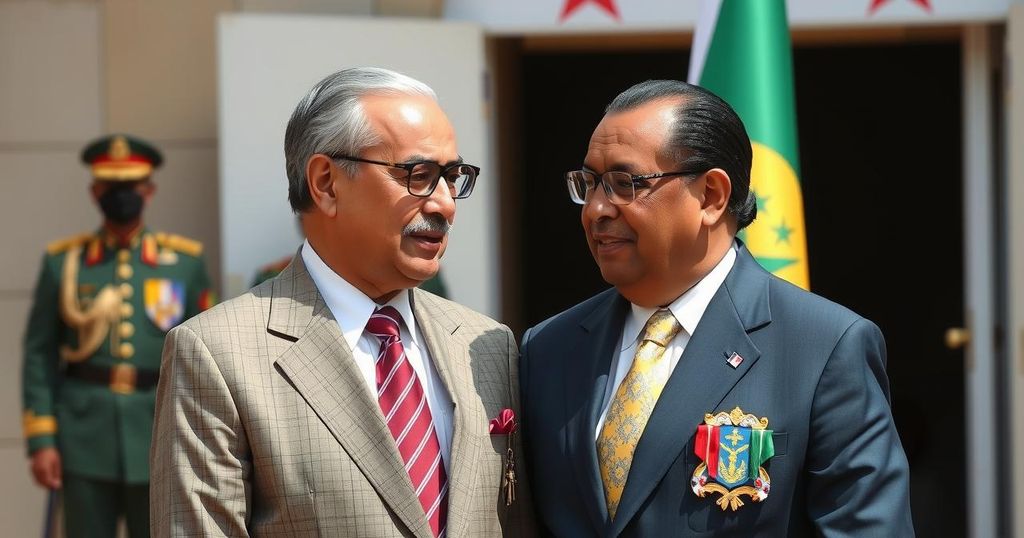Somali President Hassan Sheikh Mohamud’s recent visit to Ethiopia aims to strengthen bilateral relations following an agreement to resolve disputes. The trip underscores ongoing diplomatic efforts since the Ankara Declaration, amidst historical tensions primarily due to a controversial maritime deal. Public displays of support highlight a renewed commitment to cooperation between the two nations.
On Saturday, Somali President Hassan Sheikh Mohamud arrived in Ethiopia’s capital, Addis Ababa, marking a significant moment in the diplomatic relations between Ethiopia and Somalia. This visit follows an agreement reached a month earlier aimed at resolving a prolonged dispute between the two nations. Upon his arrival, President Mohamud was received by Ethiopian Prime Minister Abiy Ahmed, who emphasized the discussions’ intent to strengthen bilateral ties and align common priorities.
The backdrop to this visit is the Ankara Declaration, an agreement facilitated by Turkish President Recep Tayyip Erdogan, which sought to address tensions arising from Ethiopia’s controversial leasing deal with Somaliland. Following this declaration, both Somalia and Ethiopia reiterated their commitments to respecting each other’s sovereignty and territorial integrity. Furthermore, they agreed to collaborate on establishing mutually beneficial commercial arrangements while ensuring Ethiopia’s access to the sea under Somalia’s authority.
Throughout Addis Ababa, public displays of welcome were evident, with promotional images of President Mohamud and flags from both countries prominently displayed. This visit is particularly noteworthy as it is President Mohamud’s first after previous accusations of being barred from the African Union headquarters by Ethiopian security forces. The Somali government heralded the trip as a continuation of the commitments made in the Ankara agreement.
Before visiting Ethiopia, President Mohamud participated in a continental summit in Uganda alongside regional leaders, further highlighting ongoing diplomatic engagements aimed at fostering stability within the region. Kenyan President William Ruto noted the deepening relations between Somalia and Kenya since Somalia’s integration into the East African Community, reporting increased trade and collaborative efforts in promoting regional security.
As regional dynamics evolve, the outcomes of President Mohamud’s visit could play a crucial role in shaping the future interactions between Somalia and Ethiopia, potentially leading to enhanced cooperation and stability in the Horn of Africa.
The relationship between Somalia and Ethiopia has been historically complex, characterized by periods of tension and cooperation. Recent disputes, particularly over maritime access related to Somaliland, escalated diplomatic strain. The Ankara Declaration, signed on December 11, has served as a framework for resolving these conflicts, emphasizing respect for sovereignty and the pursuit of mutual benefits in commercial partnerships. Such agreements are critical in a region where stability is often contested by various factors, including inter-state relations and internal challenges. The involvement of regional players like Turkey has underscored the importance of international mediation in facilitating dialogue between neighboring countries.
President Hassan Sheikh Mohamud’s visit to Ethiopia represents a pivotal step toward restoring and enhancing diplomatic relations between the two nations, following a history of tension primarily spurred by the Somaliland issue. The Ankara Declaration continues to serve as a guiding framework to reinforce mutual respect for sovereignty and pursue shared economic goals. As regional dynamics shift, ongoing diplomatic interactions will be essential for fostering stability and preventing future conflicts in the Horn of Africa.
Original Source: www.voanews.com






